|
|
|
Sort Order |
|
|
|
Items / Page
|
|
|
|
|
|
|
| Srl | Item |
| 1 |
ID:
104786
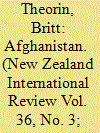

|
|
|
| 2 |
ID:
119725
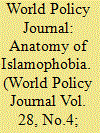

|
|
|
| 3 |
ID:
112057
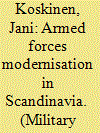

|
|
|
| 4 |
ID:
144238
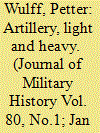

|
|
|
|
|
| Summary/Abstract |
The artillery revolution of the nineteenth century came about partly through collaboration between southern and northern Europe. Their outlooks were quite different. In the south, the Kingdom of Sardinia-Piedmont needed to go on the offensive beyond its borders to achieve its aim of creating a united Italy. In the north Sweden had the defensive aim of protecting its borders against an invading enemy. This situation called for two different kinds of artillery—light and movable in the south; heavy and powerful in the north. How the two countries, in spite of their different outlooks, came to be involved in a joint development of path-breaking artillery technology is the subject of this article.
|
|
|
|
|
|
|
|
|
|
|
|
|
|
|
|
| 5 |
ID:
119610
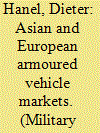

|
|
|
|
|
| Publication |
2012.
|
| Summary/Abstract |
With the start of the 21st century, the armed forces in Asia and Europe have been facing new demands as a result of radical changes in the security situation. In the foreseeable future, it is extremely unlikely that mentioned states will be threatened existentially by large - scale aggression using conventional means. Yet, safeguarding security and stability in both regions after the end of the Cold War and the need to meet global commitments for more exacting international conflict prevention and crisis management are leading to new tasks and demands placed on the Armed Forces.
|
|
|
|
|
|
|
|
|
|
|
|
|
|
|
|
| 6 |
ID:
183577
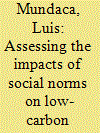

|
|
|
|
|
| Summary/Abstract |
Policymakers and scientists are paying increasing attention to how social norms can promote pro-environmental behaviour and sustainable energy use. We contribute to this field by experimenting with and assessing the impacts of social norms on low-carbon mobility options. Taking Sweden as a case study, we develop two complementary randomised controlled experiments to: 1) analyse the role of social norms in promoting the adoption of car sharing services (CSS) via descriptive and injunctive norms (N = 720); and 2) investigate potential crowd out effects when injunctive norms are used to promote a low-carbon transport hierarchy (N = 730). First-order effects show that social norms have a positive but marginal impact on the willingness to adopt CSS, and only injunctive norms have the potential to steer behaviour in the desired direction. Results also suggest that concerns about potential substitution effects between low-carbon transport options and CSS are not valid. With due limitations, our findings have various implications for policymaking, notably that for social norms to be effective, other policy instruments are critically needed. Of particular importance are the environmental effectiveness of CSS and complementarities between public transport and active mobility (i.e. walking and cycling).
|
|
|
|
|
|
|
|
|
|
|
|
|
|
|
|
| 7 |
ID:
166656
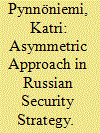

|
|
|
|
|
| Summary/Abstract |
Two observations stand out from the Russian strategic outlook. First, it corresponds with the real politik vision of world politics where the states engage in (zero-sum) competition for power and resources. Second, the new world order emerges because of a conflict between different models of development and value systems. These two observations highlight a certain “family resemblance” between the current Russian assessment of the current security environment and the situation during the Cold War. Furthermore, Russian national security strategy is oriented toward achieving strategic stability with the other great powers. The maintenance of strategic parity (nuclear and conventional deterrence) is a means to this end. However, given Russia’s relative weakness in comparison to its major geopolitical competitors, this has led to the renewal of the Cold War-era concept of asymmetric approach. Although this concept is most often used in the context of nuclear deterrence and the debate on “strategic stability,” it is not about military security only. The set of asymmetric measures from economic dependence or sanctions, to diplomatic, political, and informational measures are used to prevent an emergence of a conflict that would threaten Russia’s sovereignty and domestic stability. The purpose of this paper is to explore the Soviet roots of Active Measures and how the Soviet heritage is present at both the theoretical level and in concrete practices. Finally, insights from the conceptual analysis are applied in assessing the vulnerability of the Nordic countries, in particular Finland and Sweden, to Russian influence operations.
|
|
|
|
|
|
|
|
|
|
|
|
|
|
|
|
| 8 |
ID:
150222


|
|
|
| 9 |
ID:
103663
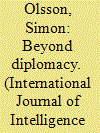

|
|
|
| 10 |
ID:
052297


|
|
|
|
|
| Publication |
Oct 2004.
|
| Summary/Abstract |
The use of biomass in Finland and Sweden has steadily increased over the past 25 years, up to approximately 20% of the primary energy supply in 2001. In both countries most biomass originates from forests. Forest biomass is now an integral part of modern energy systems, although primarily in industry and in the heating sector. For example, biomass accounts for 7.9% and 53% of the fuel mix in district heating in Finland and Sweden, respectively.
The general energy policy of both countries has supported biomass for energy over the entire period, although specific policies have changed with time. Research, development and demonstration has been continuously supported, and some subsidy schemes have been applied, in particular, for district heating systems (DHS) and combined heat and power. Heavy taxation of competing fossil fuels seems to have been the most effective policy instrument, although this has been directed mainly at the heat and transportation fuel markets. Electricity taxes are imposed on consumption (industry is largely exempt), and do not discriminate significantly between the sources of electricity. Starting in 2003, Sweden will have a quota-based system, a renewable portfolio standard, which is expected to increase biomass-based electricity production.
Both countries possess vast and not fully exploited biomass resources in the form of forests, and have a history of rational and large-scale forestry. Strong actors exist both with regard to forest ownership and the industrial processing of forest products. The user side, in particular, represented by DHS, can also be characterised by strong and professional management. Over time, structures have developed that facilitate an increased use of biomass for energy, for example, the forest industry infrastructure and extensive district heating. Actors within these structures have had the ability to react to policies, resulting in a stable growth in biomass use.
|
|
|
|
|
|
|
|
|
|
|
|
|
|
|
|
| 11 |
ID:
171590
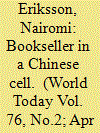

|
|
|
| 12 |
ID:
121907
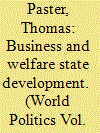

|
|
|
|
|
| Publication |
2013.
|
| Summary/Abstract |
In recent years, employer-centered explanations of welfare state development have begun to challenge conventional labor-centered and state-centered explanations. These new explanations suggest that sector-specific business interests and cross-class alliances propelled the adoption and expansion of social programs (the business interests thesis). This article presents a novel explanation of differences in business support for welfare state expansion based on a diachronic analysis of the German case and shadow case studies of Sweden and the United States. The article suggests that when looking at changes in employers' positions across time rather than across sectors, political constraints turn out to be the central factor explaining variation in employers' support for social reforms (the political accommodation thesis). The article identifies two goals of business intervention in welfare state development: pacification and containment. In the case of pacification, business interests propel social policy expansion; in the case of containment, they constrain it. Business chooses pacification when revolutionary forces challenge capitalism and political stabilization thus becomes a priority. Business chooses containment when reformist forces appear likely to succeed in expanding social protection and no revolutionary challenge exists. The article shows that changes over time in the type of political challenges that business interests confront best explain the variation in business support for labor-friendly social reforms.
|
|
|
|
|
|
|
|
|
|
|
|
|
|
|
|
| 13 |
ID:
171290
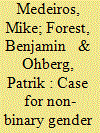

|
|
|
|
|
| Summary/Abstract |
LGBTQ activists and academics advocate the use of non-binary gender categories to include individuals who identify as neither rigidly male nor rigidly female to reflect the increasing number of people who do not place themselves in these two conventional classes. Although some general-population surveys have begun using non-binary gender questions, research has not examined the consequences of using (or not) a question with non-binary gender categories in surveys and censuses. Our study addresses this gap using a survey experiment in which respondents in the United States, Canada, and Sweden randomly received a binary or a non-binary gender question. We find no evidence of negative reactions to the non-binary question. Moreover, when there is a statistical difference, the reactions are positive. We thus conclude that general-population surveys could use a non-binary question without facing significant adverse reactions from respondents.
|
|
|
|
|
|
|
|
|
|
|
|
|
|
|
|
| 14 |
ID:
100968
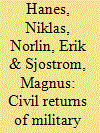

|
|
|
|
|
| Publication |
2010.
|
| Summary/Abstract |
The purpose of our study was to examine the effect of military training on the earnings of young men in Sweden. The analysis is based on the cohort of males born in 1973. This cohort was conscripted during a time of rapid change in Swedish security policy and substantial cutbacks in the armed forces. As a consequence, a relatively large proportion of the cohort was assigned a service category after the enlistment test but one third of these individuals were never conscripted. We argue that these organizational changes, along with data on important background variables, make it possible to rely on selection on observables. A clear finding is that military training has a positive effect on annual earnings at the age of 30 for those men in the category 'private soldier' who do not subsequently obtain a high level of educational.
|
|
|
|
|
|
|
|
|
|
|
|
|
|
|
|
| 15 |
ID:
076800
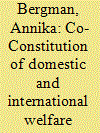

|
|
|
|
|
| Publication |
2007.
|
| Summary/Abstract |
Sweden's self-narrative is that of an outward-looking internationalist state whose commitments to justice and equality are not confined to co-nationals. What distinguishes Swedish internationalism, apart from being social democratically inspired, is that it rests on a thin conception of cosmopolitan duty that does not exclusively privilege the rights of Swedish nationals alone, but recognizes the need to extend social and political rights to non-nationals as well. Key here is the universality principle of the Nordic welfare model, which inspires policies that do not tend to discriminate on the basis of class or ethnic background. What is more, this way of thinking has not generally been confined to the domestic level, but can be traced through to Sweden's (and the other Nordic states') distinctive foreign policy traditions. This article examines the inter-connection between domestic and international welfare commitments in the Swedish context. The key thesis developed here is that states that promote the values of solidarity, inclusiveness and universal welfare at the national level are also more likely to do so beyond borders. The article deconstructs the endogenously framed ideational factors that underpin Swedish internationalism, with particular focus on social democracy in the process. It also investigates the co-constitutive relationship between Sweden's domestic and international welfare commitments by exploring contemporary discourses and practices that make up a significant part of Sweden's self-identity. Finally, it analyses the normative relevance of a social democratically inspired Swedish internationalism for the future of Nordic internationalism more generally.
|
|
|
|
|
|
|
|
|
|
|
|
|
|
|
|
| 16 |
ID:
177913
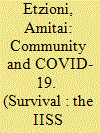

|
|
|
|
|
| Summary/Abstract |
Based on the records of these three countries, liberal–communitarian values have acquitted themselves well during a major international health crisis
|
|
|
|
|
|
|
|
|
|
|
|
|
|
|
|
| 17 |
ID:
179013


|
|
|
|
|
| Summary/Abstract |
This paper is about self-identification by a sample of young people with various migrant backgrounds in Sweden. In a survey we asked them how they present themselves to others in different contexts (in their schools and neighbourhoods or when they are out of Sweden). Our findings suggest that young people’s identification is not fixed. The paths to these various forms of identification are shaped by a variety of individual (class background, parents’ country of origin) and social factors (friendship networks and school composition). The results indicate that those who identified themselves as Swedish or hyphenated tended to be quite similar as regards their other characteristics, while those who presented themselves with the parents’ birth country or religious affiliation have very little in common.
|
|
|
|
|
|
|
|
|
|
|
|
|
|
|
|
| 18 |
ID:
179966
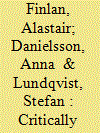

|
|
|
| 19 |
ID:
038097
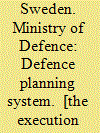

|
|
|
|
|
| Publication |
Sweden?, Ministry of Defence, 1969.
|
| Description |
24p.
|
|
|
|
|
|
|
|
|
|
|
|
Copies: C:1/I:0,R:0,Q:0
Circulation
| Accession# | Call# | Current Location | Status | Policy | Location |
| 006472 | 335.6/SWE 006472 | Main | On Shelf | General | |
|
|
|
|
| 20 |
ID:
141784
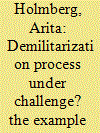

|
|
|
|
|
| Summary/Abstract |
During the past decades, the process of militarization that characterized Sweden after the Second World War has been replaced by a process of demilitarization. With the debates following the war in Georgia 2008 and the Russian annexation of Crimea in 2014, this process of demilitarization appears under challenge. This raises questions about the nature of these processes and the problems facing the attempts at turning them around. The article introduces a framework for analysing the influence of the military upon politics and society in the twenty-first-century European context with the aim of better understanding the various traits, their interconnections and relation to broader trends in Europe and the West. The analysis shows that traits of demilitarization are still dominating in Sweden, although some indications of remilitarization can be found.
|
|
|
|
|
|
|
|
|
|
|
|
|
|
|
|
|
|
|
|
|